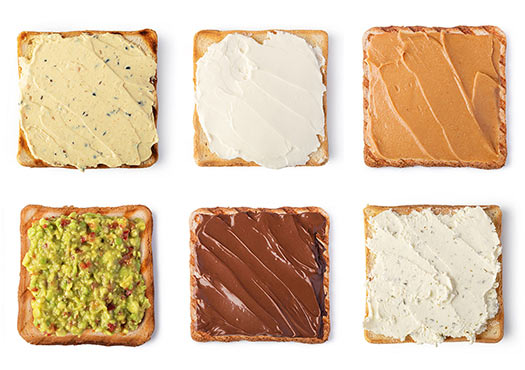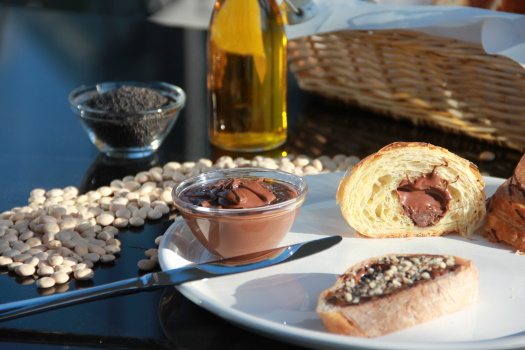Many spreads for bread and crackers contain high amounts of saturated fatty acids


Both sweet and savory spreads are very popular products. There are many different product types and the demands of consumers regarding the taste, shelf-life, and spreadability require the lipid components in the spreads to have special functional properties. Most of the animal or plant based saturated fats that are used are solid (of high melting point) at room temperature and their physical properties are decisive for the texture and quality of the products.
Many spreads, and in particular those containing chocolate or nuts, contain high amounts of palm oil whose production is environmentally controversial. For this reason and also due to the negative effects of saturated fatty acids, the food industry is endeavoring to replace this with unsaturated fats. One option is to replace all the palm oil with plant oil. However, the end products generally then have very different products to the reference, in particular too low viscosity and reduced spreadability.
Oleogels as a replacement for saturated fats
The EIT Food Oleogels project is being carried out in collaboration with partners from Poland and Spain. The project aims to develop systems (oleogels) which have fat-like structures and properties (semi-solid) and which are made from unsaturated fats such as rapeseed oil and sunflower oil and structure-giving components. The use of oleogels should allow the complete replacement of palm oil in chocolate spreads.
An oleogel can be described as a system whereby the processing technology that is used for its manufacture changes the physical properties of the oil without having to chemically modify this. The role of the Fraunhofer IVV in the project is to develop and optimize oleogels in the laboratory and on a small pilot plant scale. In the first phase of the project plant oils having a selection of structure-giving components will be screened. Various processing technologies will be used for this.
Successful development of chocolate spreads using oleogels
After successful development of oleogels and their use in chocolate spreads on a small pilot plant scale, further scale up work to industrial quantities involved customizing the formulation components to meet the necessary sensory, texture, and shelf-life requirements. The manufacturing method can be economically implemented in industry without major changes to the process.
Analyses showed that chocolate spreads with oleogels have a comparable texture to standard chocolate spreads. The use of oleogels allowed the amount of saturated fatty acids to be lowered by at least 25%. Simultaneously the nutritional value was significantly improved by the increased amount of unsaturated fatty acids. The products had excellent spreadability under both warm and cool ambient temperatures. The chocolate spreads that were successfully manufactured on an industrial scale were evaluated as being 'good’ or ‘very good’ in a consumer survey compared to a standard chocolate spread made with palm oil.
The products developed in this project emphasize the potential of olegels as a sustainable alternative to environmentally controversial palm oil. At the same time the nutritional value of the products is improved by the healthier unsaturated fatty acids.
Project term: |
2019 to 2020 |
Project funding/ management: |
EIT-Food EU, EU Framework Programme for Research and Innoavtion Horizon 2020 |
Project partners: |
Fraunhofer IVV (Germany), University of Warsaw (Poland), Acesur (Spain), Maspex (Poland) |
Website: |
 Fraunhofer Institute for Process Engineering and Packaging IVV
Fraunhofer Institute for Process Engineering and Packaging IVV